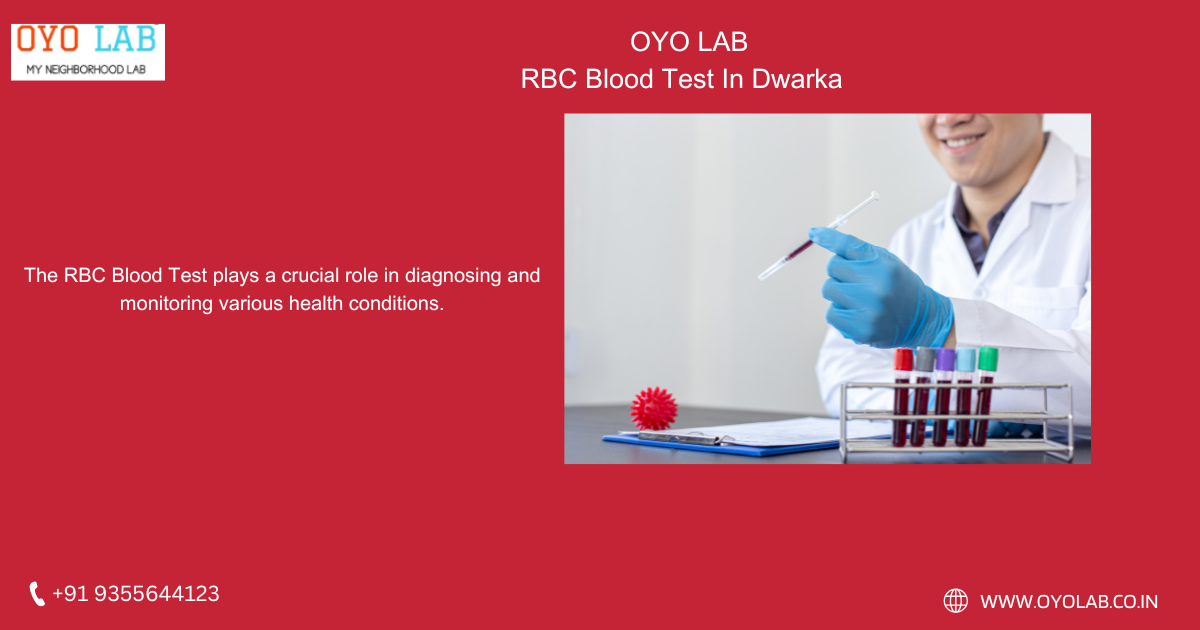
RBC Blood Test In Dwarka
By Shilpa | April 01, 2025
What Is RBC Blood Test ?
The RBC (Red Blood Cell) Blood Test measures the number of red blood cells in your blood. Red blood cells are responsible for carrying oxygen from your lungs to the rest of your body.
Why is the RBC test done?
Doctors order this test to:
-
Check for anemia (low RBC count)
-
Diagnose polycythemia (high RBC count)
-
Monitor chronic diseases that affect blood cell production
-
Evaluate overall health
Normal RBC Count
-
Men: 4.7 to 6.1 million cells per microliter (μL) of blood
-
Women: 4.2 to 5.4 million cells per μL
-
Children: 4.1 to 5.5 million cells per μL
Causes of High RBC Count
-
Dehydration
-
Lung disease
-
Heart disease
-
Kidney problems
Causes of Low RBC Count
-
Anemia (iron or vitamin deficiency)
-
Blood loss
-
Bone marrow disorders
-
Chronic diseases
Importance Of RBC Blood Test
The RBC (Red Blood Cell) Blood Test is an important diagnostic tool used to assess overall health and detect medical conditions.
Why is the RBC Test Important?
-
Helps Diagnose Anemia
-
A low RBC count may indicate anemia, which can cause fatigue, weakness, and shortness of breath.
-
It helps determine if the anemia is due to iron deficiency, vitamin B12 deficiency, or blood loss.
-
-
Detects Polycythemia (High RBC Count)
-
A high RBC count may be a sign of lung disease, heart problems, or dehydration.
-
It helps doctors assess oxygen levels and overall blood health.
-
-
Monitors Chronic Diseases
-
Conditions like kidney disease, bone marrow disorders, and cancer can affect RBC production.
-
The test helps track these conditions and the effectiveness of treatments.
-
-
Assesses Oxygen-Carrying Capacity
-
RBCs transport oxygen throughout the body.
-
An imbalance in RBC count can lead to oxygen deficiency, dizziness, and poor circulation.
-
-
Evaluates Overall Health
-
Doctors may order an RBC test as part of a routine checkup to detect underlying issues before symptoms appear.
-
Benefits Of RBC Blood Test
The RBC (Red Blood Cell) Blood Test is a simple yet essential diagnostic tool that provides valuable insights into a person’s health.
Key Benefits:
-
Early Detection of Health Issues
-
Helps identify conditions like anemia, dehydration, and blood disorders before symptoms become severe.
-
Allows for early intervention and treatment.
-
-
Monitors Oxygen Supply in the Body
-
RBCs carry oxygen to tissues and organs.
-
The test helps ensure that the body is receiving enough oxygen for proper function.
-
-
Assists in Diagnosing Medical Conditions
-
Helps diagnose anemia, polycythemia, heart disease, lung disease, and kidney disorders.
-
Can indicate underlying health problems that require further investigation.
-
-
Tracks the Effectiveness of Treatments
-
Used to monitor treatment progress for conditions like anemia or bone marrow disorders.
-
Helps doctors adjust medications or therapies as needed.
-
-
Supports Overall Health Assessments
-
Often included in routine health checkups to assess general well-being.
-
Provides a baseline for tracking health changes over time.
-